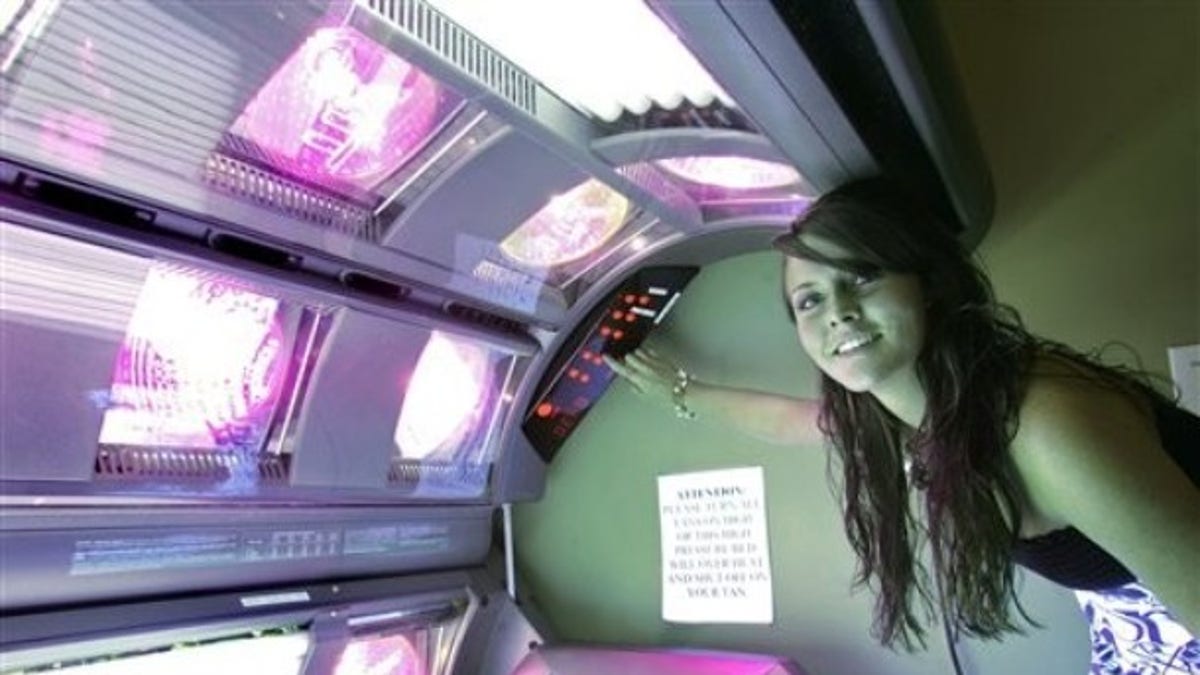
Rosie McDavid, 17, who has been using tanning beds since she was 14, prepares a tanning bed for a session, Wednesday, March 25, 2009, in Tallahassee, Fla. The Florida Legislature is considering a bill that would restrict tanning bed use by minors. (AP Photo/Phil Coale) (AP Photo)
A government-backed expert panel joined in the fight against skin cancer on Tuesday with a proposal urging doctors to counsel fair-skinned youths about sun protection.
"The definition of fair skin is it doesn't tan very well, so stop trying!" said Dr. Virginia Moyer, head of the Preventive Services Task Force (USPSTF). "All you are doing is damaging your skin."
The new proposal, posted in draft form on the USPSTF's website, is the latest attempt to shield Americans against the cancer-promoting effects of ultraviolet, or UV, radiation.
Earlier this year, the American Academy of Pediatrics joined the World Health Organization, the American Academy of Dermatology and other groups pushing for a ban of indoor tanning.
According to Moyer, research has shown a strong link between UV radiation and skin cancer.
More than two million Americans get skin cancer every year, but most cases aren't very dangerous and can usually be cured.
"It's not going to kill them, but it's no fun either," said Moyer, whose mother has skin cancer and is currently getting injections with chemicals to destroy the tumor cells.
About one in 50 white Americans born today will get a deadlier type of skin cancer called melanoma at some point. The American Cancer Society estimates that melanoma causes just under three-quarters of the nearly 11,800 skin cancer deaths every year.
The USPSTF recommendation spans children and young adults 10 to 24 years old and updates a 2003 statement that said the evidence was insufficient to give advice.
According to the panel, there is now sufficient evidence that counseling people in this age group —for instance by showing them pictures of wrinkled, sun-damaged skin—will make them more careful about sunbathing and indoor tanning.
"The approach that you take is not, 'Stay out of the sun and prevent cancer.' It is, 'Stay out of the sun and prevent ugly skin,'" Moyer told Reuters Health. "There is nothing more important to a teenager than how they look."
For kids under 10 and adults over 24, the panel said there is not enough evidence that counseling changes behavior. And for older adults, Moyer added, chances are that a sunburn won't have time to cause tumors.
"Sun damage takes a long time to evolve into something," she said.
The American Academy of Dermatology (AAD) welcomed the new recommendations but said the USPSTF hadn't gone far enough.
"The Academy believes sun protection counseling is important for everyone, including the adult population," AAD President Dr. Ronald L. Moy told Reuters Health by email.
"More than 3.5 million skin cancers in more than 2 million people are diagnosed annually, and excessive exposure to ultraviolet radiation from the sun and tanning beds is the most preventable cause of all skin cancers."
The American Cancer Society promotes sun protection with the slogan "Slip! Slop! Slap! and Wrap" —that is, Slip on a shirt, Slop on sunscreen, Slap on a hat, and Wrap on sunglasses.
Moyer said there are no signs that following such advice would have downsides, like kids not playing outside or lacking vitamin D, which is made by the skin when it's exposed to sunlight.
"There is absolutely no evidence that fair-skinned people who avoid sun exposure have vitamin D deficiency," she said.
Although the USPSTF doesn't consider cost, Moyer acknowledged that advising young people about sun protection requires valuable time from busy doctors.
